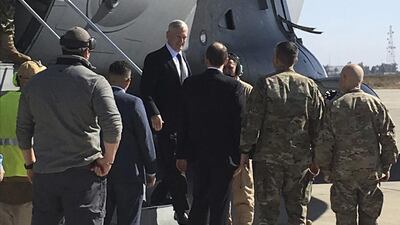BAGHDAD // The United States is not about to plunder Iraq’s petroleum reserves, said defence secretary Jim Mattis, who arrived in Baghdad for an unannounced visit on Monday, as he sought to soothe partners rattled by remarks president Donald Trump made.
Mr Trump has repeatedly said during his campaign and since his election that America, whose troops occupied Iraq for eight years, should have grabbed Iraqi oil to help fund its war effort and to deprive ISIL of a vital revenue source.
But Gen Mattis, a retired Marine general who commanded troops during the 2003 invasion of Iraq, appeared to dismiss the idea.
“All of us in America have generally paid for gas and oil all along, and I am sure that we will continue to do so in the future,” Gen Mattis said at the start of his visit to Iraq.
“We are not in Iraq to seize anybody’s oil,” he said.
While speaking at the CIA headquarters last month, Mr Trump cited the adage, “To the victor belong the spoils,” and said America “should have kept the oil” after pulling most of its troops out of the country under his predecessor Barack Obama.
The president then added, without elaborating, that “maybe we’ll have another chance”.
Gen Mattis, on his first trip to Iraq as Pentagon chief, is hoping to get a first-hand assessment of the war effort as US-backed Iraqi forces launch a new push to evict ISIL militants from their remaining stronghold in Mosul.
Iraqi forces backed by jets and helicopters battled their way to Mosul airport on Monday as they prepared to take on the ISIL extremist group’s stronghold in the city’s west bank. The Iraqi forces plan is to turn the airport into a close support base for the onslaught into western Mosul itself.
The fresh push in the four-month-old operation to retake Mosul has sparked fears for 750,000 trapped civilians who risk getting killed trying to flee and face starvation if they stay.
Federal police forces reached the Aqrab checkpoint on the highway from Baghdad, a spot that marks the southern entrance to Mosul and from which the city is clearly visible.
“It is very important because it is considered to be Mosul’s southern gate,” Lieutenant General Haider Al Mtoury, of the federal police, said as he stood at the checkpoint.
He said his forces faced many ISIL car bombs and suicide bombers as they advanced to within barely two kilometres of the city limits.
Iraqi forces also secured a strategic area known as the Al Buseif hills near Mosul airport, on the southern approach to the city.
Federal police forces, as well as elite units from the interior ministry, army soldiers and Hashed Al Shaabi (Popular Mobilisation) paramilitary fighters, launched a major assault on Sunday.
On Monday, the Hashed Al Shaabi pushed north on their desert front further west and reached the road linking Mosul to Tal Afar, a town to the west which is still under ISIL control.
That will further isolate what senior US officials said on Monday were the 2,000 ISIL fighters still left inside Mosul.
ISIL militants are essentially under siege in western Mosul, along with an estimated hundreds of thousands of civilians, after they were forced out of the eastern part of the city in the first phase of an offensive that concluded last month, after 100 days of fighting.
The assault marks a new phase in the broad operation launched on October 17 to retake Mosul, Iraq’s second city and the extremists’ last major stronghold in the country.
The recapture of Mosul would deal a death blow to the “caliphate” which ISIL chief Abu Bakr Al Baghdadi proclaimed in the city in June 2014 but has been shrinking steadily for two years as anti-ISIL forces advanced.
But it took Iraq’s most seasoned forces, the elite Counter-Terrorism Service, two months to retake east Mosul, where ISIL put up stiffer than expected resistance.
* Agence France-Presse and Reuters

